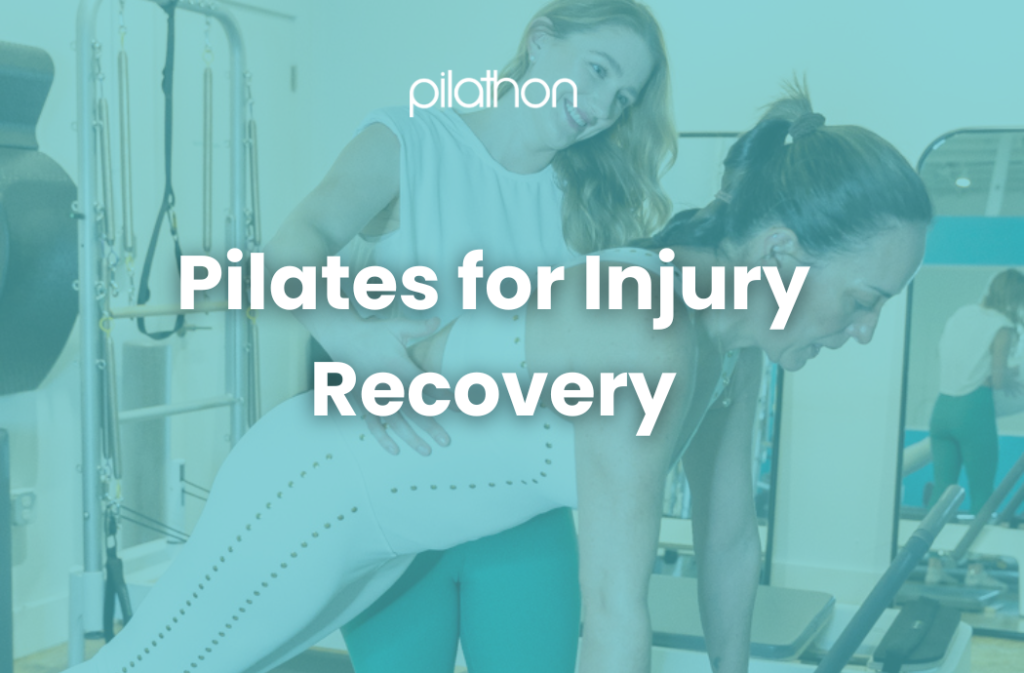Pilates is an effective tool for injury rehabilitation due to its emphasis on controlled movements that promote healing without exacerbating the injury.
Unlike high-impact exercises, Pilates focuses on precise, deliberate motions that enhance muscle strength, flexibility, and stability while minimizing stress on the injured area.
The core principles of Pilates— conscious breathing, control, centering, concentration, and precision—make it particularly suitable for individuals recovering from injuries.
The controlled environment allows for gradual progression, ensuring that exercises are performed correctly and safely. This careful approach helps prevent further injury and supports the body’s natural healing process.
Contents on this article
Why is Pilates Beneficial for Injury Recovery?
Strengthening Muscles
Pilates exercises are designed to target and strengthen the whole body, yet it can work very specific muscle groups, which can be crucial for rehabilitation. Strengthening the muscles surrounding an injured area helps provide better support and reduce strain on the affected part, promoting proper recovery.
Improving Flexibility
Stretching and lengthening exercises in Pilates help improve flexibility, which can be limited due to injury or immobilization. Increased flexibility aids in restoring the full range of motion and reducing stiffness, which is essential for effective rehabilitation.
Enhancing Stability
Improved stability helps in redistributing forces more evenly across the body, reducing the risk of compensatory injuries and supporting proper alignment and movement patterns.
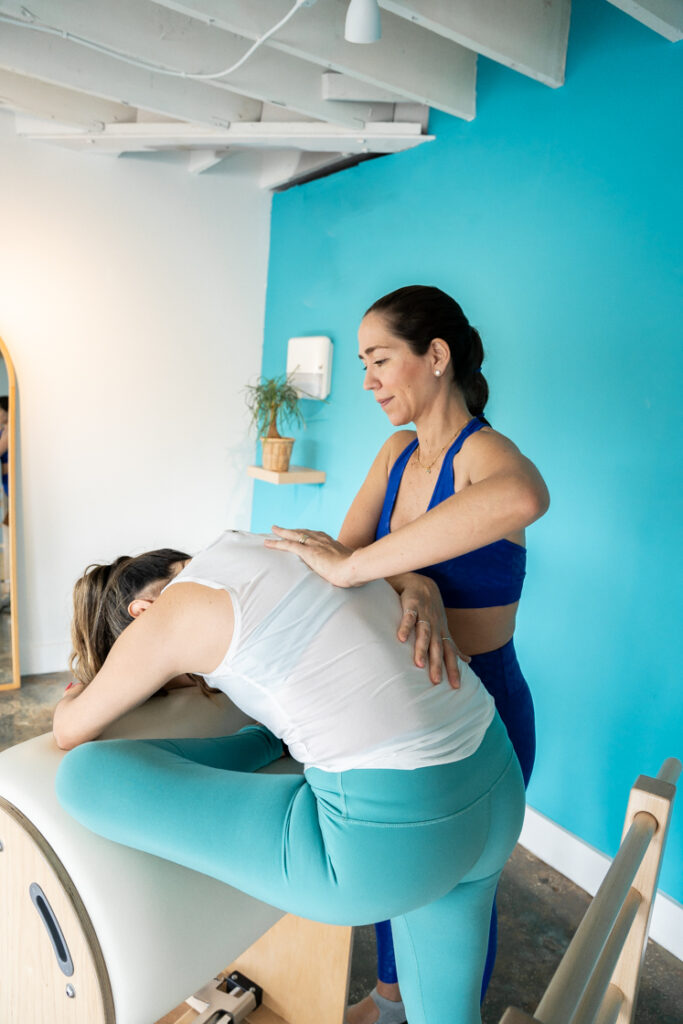
Conditions That Can Benefit from Pilates
Neck or Lower Back Pain
Regular Pilates practice strengthens the muscles of the upper back and shoulders while promoting proper alignment of the head, neck, and shoulders. This approach is highly effective in managing neck pain, as well as discomfort in the lower back.
By consciously aligning the ribcage and pelvis, the core muscles engage almost automatically, alleviating pressure in the lower back area. This improvement in spinal alignment and better posture not only reduces discomfort but also helps prevent future issues.
Joint Issues
Whether it’s knee pain, shoulder injuries, or hip problems, Pilates offers gentle exercises that strengthen the muscles around the joints without causing additional stress. This can improve joint function, reduce pain, and enhance overall mobility.
Muscle Strains
Recovery from muscle strains can be significantly aided by Pilates. Progressively loading the affected area and regularly stretching are the most effective way to heal. By gradually reintroducing movement and improving muscle function, you can avoid overwhelming the injured area.
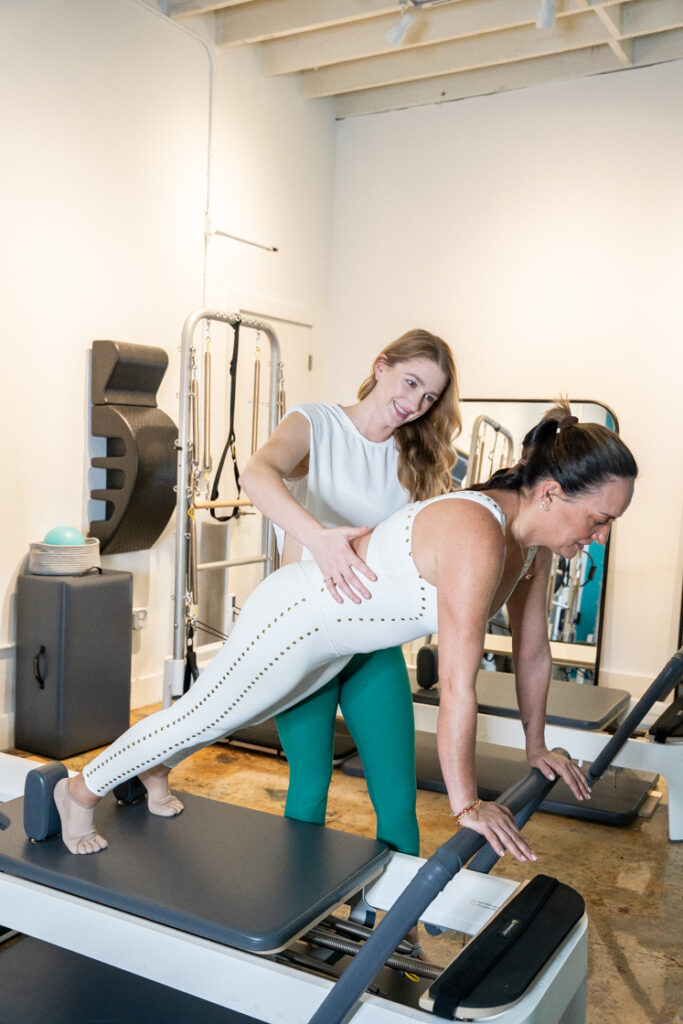
Can You Do Pilates While Injured?
Before beginning or continuing Pilates during injury recovery, it is crucial to consult with a healthcare provider. They can provide a comprehensive assessment of your injury, recommend appropriate modifications, and ensure that Pilates is a suitable option for your specific condition.
Once you have received the green light from your healthcare provider to start exercising, it’s wise to restart Pilates with at least 10 private sessions. This approach allows for re-educating the nervous system through a personalized program tailored to your recovery needs.
Your healthcare provider can also help you understand any limitations or precautions you need to take, ensuring that you don’t aggravate the injury further.
We also advise following the following recommendations:
Adjust Pilates Exercises Based on Your Injury
This is essential to accommodate the type and severity of your injury. Here’s how you can make these adjustments:
- Injury Assessment: Identify the specific area of injury and understand how it impacts your ability to perform certain movements. For example, if you have a lower back injury, exercises that involve flexing or extending the spine might need to be modified.
- Exercise Modification: Opt for exercises that do not place undue stress on the injured area. For instance, if you have a shoulder injury, avoid exercises that require heavy lifting or excessive shoulder rotation. Instead, focus on movements that maintain range of motion and build strength without aggravating the injury.
- Intensity and Range of Motion: Start with low-intensity exercises and gradually increase the intensity as your injury heals. Pay attention to your range of motion and avoid pushing beyond comfortable limits. This approach helps in preventing further strain and supports gradual recovery.
Work with a Certified Instructor
- Seek Expertise: A certified Pilates instructor with experience in injury rehabilitation can offer valuable guidance. They can help design a program tailored to your injury and recovery goals, ensuring that exercises are performed safely and effectively.
- Regular Monitoring: Regular sessions with a qualified instructor allow for ongoing assessment of your progress and adjustments to your routine as needed. This personalized approach enhances safety and optimizes recovery.
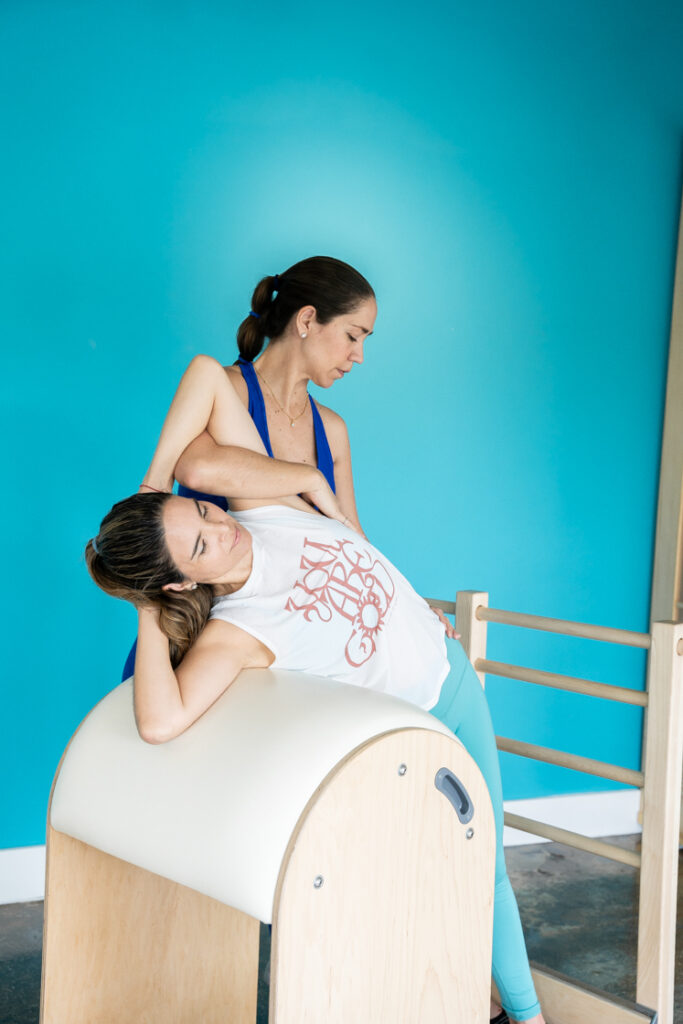
By following these guidelines, you can safely incorporate Pilates into your injury recovery process, promoting healing while minimizing the risk of further injury.
Precautions for Certain Medical Conditions
If you are in any of the following scenarios, we advice against engaging in Pilates for injury recovery:
Severe Acute Injuries
Individuals with severe acute injuries or conditions that require immediate medical attention, such as recent fractures, severe sprains, or significant muscle tears, should avoid Pilates until they have received medical clearance and their condition has stabilized.
Recent Surgeries
People who have undergone recent surgeries should avoid Pilates until they have fully healed and received approval from their surgeon or physician.
Depending on the type of surgery, some Pilates movements may need to be postponed or adjusted to accommodate the healing process.
Once a healthcare professional has given you the green light to start moving, we recommend starting with private sessions before joining group classes. This approach allows for personalized instruction and modifications, as mentioned before.
Pregnancy Complications
While prenatal Pilates can be beneficial, individuals with specific pregnancy complications (e.g., placenta previa, severe preeclampsia) should avoid Pilates or only participate under strict medical supervision. Always consult with a healthcare provider for tailored advice during pregnancy.
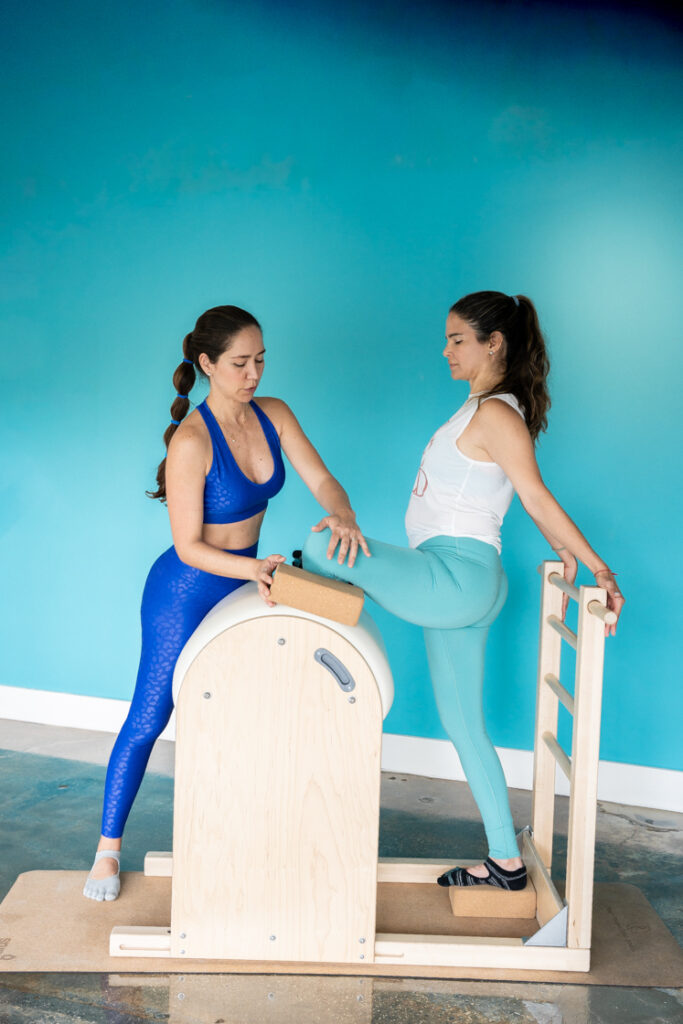
Conclusion
Pilates offers numerous benefits for injury recovery and rehabilitation. Its emphasis on gradual, controlled movements, core strengthening, and improved alignment makes it a valuable tool for supporting the healing process.
By engaging in Pilates, individuals can enhance muscle strength, improve flexibility, and promote stability, all of which contribute to effective and sustainable recovery from various injuries.
However, ensuring a safe and effective Pilates practice requires careful consideration. Consulting with healthcare providers is crucial to assess the suitability of Pilates for your specific condition and to receive personalized recommendations.
Additionally, working with certified Pilates instructors who have experience in injury rehabilitation ensures that exercises are tailored to your needs and performed correctly.
If you have the green light from your doctor, live in Little River or Wynwood, FL, and would like to join our Pilates classes to assist with your injury recovery, check our schedules below!
Here’s what our clients who’ve recovered from injuries with Pilates’ help say:
“Living with lower back arthritis, I deal with daily pain, but every class at Pilathon provides me with such relief that it feels like a miracle. The knowledgeable instructors not only help alleviate my pain but also make sure to provide personal adjustments and tips to enhance my practice” –Sofia Dunin
“Suffered from cervicogenic migraines for years… Day to day at work did not help with posture… I started at Pilathon in February, at least twice a week, and I haven’t had a single migraine ever since. Pilates at Pilathon has truly changed my daily routines and I couldn’t be happier” –Bea Michelangeli
“Best pilates studio in Miami! Emily Bench, the founder and creator of the Pilathon method, has helped me tremendously to improve my physical health and performance in sports. I’ve been dealing with a spine injury since I was a teenager, and she was able to improve my spine mobility and teach me all the tricks to make my body function better” –Camila Straschnoy
“Amazing Pilates studio with teachers full of heart and knowledge. I am so grateful to find a studio with such well trained teachers who go up and beyond to care for you. Both the Wynwood studio and Little River studio are amazing, beautiful and clean. I personally send my patients to Pilathon as well!! Emily and her team fixed my back twice. The best of Miami!!!” –Elizabeth Trattner

